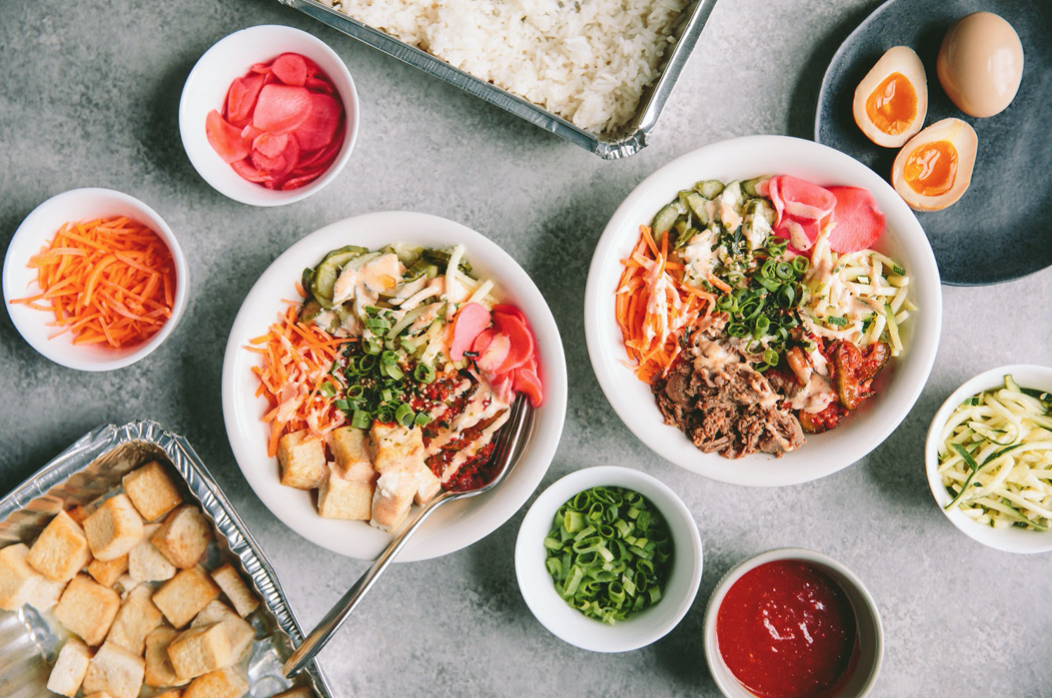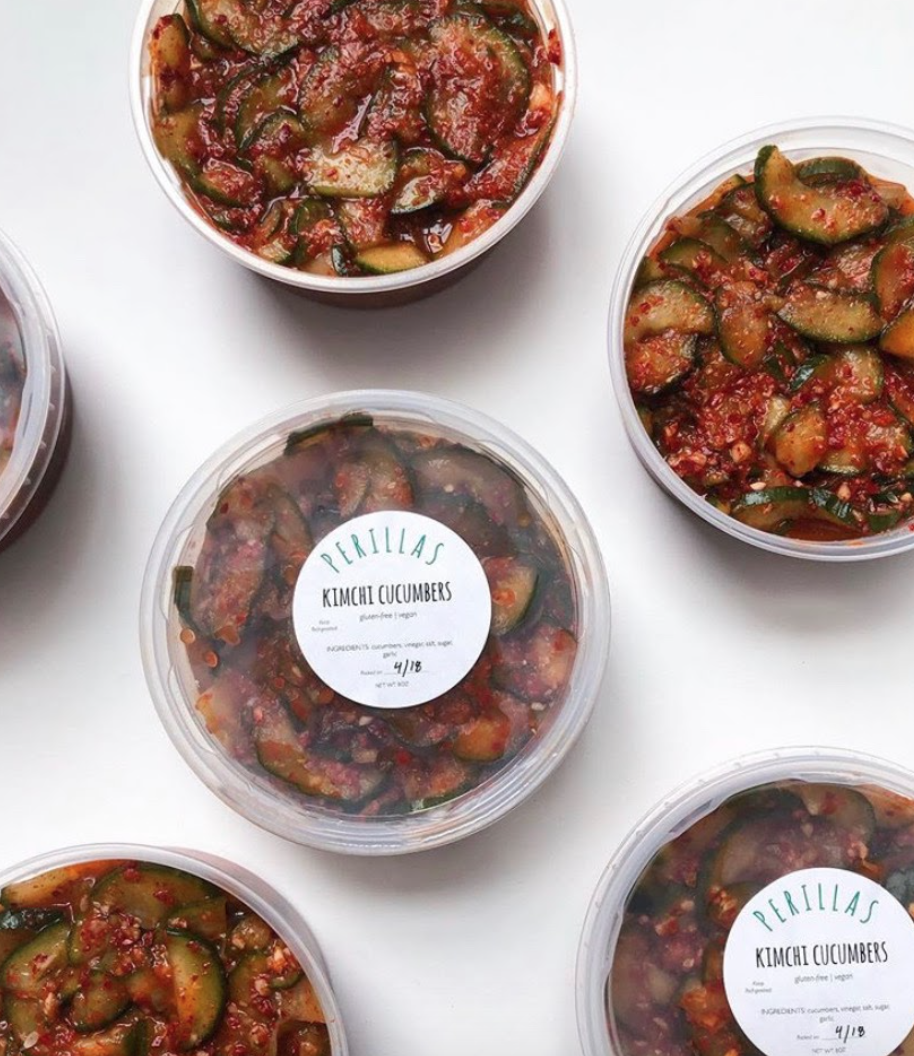On the Perillas Menu: Dignity, Respect, and Bibimbap
/This week, our Member Monday campaign highlights James Choi, founder of Perillas, a fast-casual Korean eatery specializing in bibimbap, a traditional Korean rice dish topped with vegetables and meat. Through a career in finance and consulting, James saw just how much leadership and culture affects the workplace. Attending Gordon-Conwell Theological Seminary to learn about Workplace Leadership and Ethics, he started shaping Perillas’ culture and values rooted in the treatment of people with dignity and respect; a focus on people which ultimately creates more value than focusing primarily on profits; and sharing in the joy of delicious and healthy Korean food in a fast, convenient, and affordable way.
Following the launch of Perillas catering and a temporary pop-up location, James is opening a permanent storefront in Bow Market this summer. Read on to learn about the inspiration behind the company, mission-driven businesses, and more.
What was the inspiration behind opening a fast-casual bibimbap eatery, and what is the origin of the name “Perillas”?
I’m biased, but I think Korean food is one of the best cuisines. I grew up eating it, and it didn’t hurt that my mom is a great cook. I started to notice that while there were Korean restaurants around Boston, there wasn’t a fast-casual option. You would have to go in, sit down, and order. Most other mainstream Asian cuisines, however, were available in fast and convenient ways. That’s where I saw a potential gap in the market, and thus Perillas was born.
Perillas derives from a perilla leaf. It’s from the mint family, and is used in Korean cuisine. There really isn’t a deep meaning behind it; I was looking for a name that had subtle links to Korean food and was unique enough to stand out. I also thought about how well it would do when you searched the word on Google. I didn’t want to have to compete with thousands of other websites to rank on the first page when people search for us, so I stayed away from names that are too common.
I picked bibimbap as our first product for a couple reasons. First, I saw that there was a similar style of food that people were very familiar with — the burrito bowl. Chipotle took off, and bibimbap wasn’t too different in concept. It had a base, protein, vegetables and other toppings. Second, bibimbap seems to be more of a gateway dish when people start trying Korean food for the first time. It also was becoming a buzzword, along with kimchi, bulgogi and gochujang - all of which are in our bowl. Most importantly, however, I felt as though bibimbap could easily be served in a fast and convenient way.
You have a background in finance. How did you pivot from the finance world to food? What challenges did you face in this transition?
Deep down inside I’ve always known I wanted to be an entrepreneur. It wasn’t until I was 33 years old that I decided to finally pursue my dreams. Here’s how it happened.
My parents are immigrants from South Korea and small business owners. They wanted the best life for me and they felt as though getting a degree, joining a big corporation, and rising up the ranks throughout my career was the best path forward, so that’s what I did for five years after college.
In 2012 I left my job to start graduate school, where I learned workplace leadership and ethics. Upon graduating in 2016, I was determined to go back into the workplace and help shape the culture to where all people who come to work can feel cared for and empowered. However, right when I was about to graduate, I was diagnosed with cancer. Thankfully, I was healed, but after that I couldn’t land a job — that lasted a year. I came to a place where I felt I had nothing to lose in trying to pursue my dreams of entrepreneurship, and that, ultimately, I can best shape the culture of a workplace as the owner.
I had the idea for fast-casual bibimbap for many years prior, but I had no food experience. I took a job working in a fast food restaurant to learn about the operations. After a year, I left and gave myself 2 months to launch this concept.
As I mentioned earlier, I knew I always wanted to be an entrepreneur, but fear and timing prevented me from pursuing it earlier. Fear of feeling like I was inadequate, fear of feeling like I didn’t have enough money to start, fear of disappointing my parents, etc. There were also moments in my life where it just wasn’t the right time. Needless to say, there have been many challenges!
In 2018, Perillas launched its first storefront as a temporary pop-up location in Bow Market, located in Somerville, Massachusetts. Why did you decide to start with a pop-up storefront, and how did you leverage the customer base visiting the market to raise awareness about Korean food?
I feel as though the traditional restaurant model is a bit archaic and doesn’t set you up for success. I’m generalizing, but typically you spend hundreds of thousands of dollars to build out your concept. Then your revenue needs to outpace your debt for the next 5 or so years. That is really tough, especially when margins are already tight. I wanted to see if I could bootstrap this business.
I started Perillas with $15,000. After becoming a member of Foundation Kitchen, a shared commercial kitchen in Somerville, I needed a way to start selling my product. I identified two ways to do that with little to no upfront cash – pop-ups at breweries, and catering office lunches. After doing some research, I stumbled upon Bow Market and saw that they had one designated spot to serve as a temporary pop-up space. It was perfect for us for many reasons.
First, it was already built out and all we essentially had to do was go in and sell. The trade off, however, was that we would pay more per square foot in rent than normal.
Second, it was small, like 150 square feet small. That meant that while the rent price per square foot was pretty high, the absolute cost per month was still manageable.
Lastly, it was in a marketplace along with many food concepts and retail stores. They also were able to hold events pretty frequently that drew large crowds (I really miss the pre-COVID days!).
For those reasons, this was a huge win for us because it gave us a low-risk way to build our brand, hone our operations, and test our concept in the first year.
Perillas is a mission-driven business founded on the belief that all people should be treated with dignity and respect. How did you craft your values at Perillas and how have you carried those through in your day-to-day operations?
We created our values at Perillas based on this simple fact — your worth derives from your identity as a human being, made in the image of God. This comes before anything and everything else. It doesn’t matter if you’re the CEO or the janitor, wealthy or poor — your occupation doesn’t dictate your worth. That’s why we believe in treating all people with dignity and respect. Some of the ways we carry that out is through the product we serve. We want to make sure that we are serving our customers clean and healthy products to the best of our ability. This can be challenging sometimes because we have to make the economics work, but we will strive to make sure that we can create healthy products from scratch.
We also believe that business can be an amazing platform to add value to the world. For a while, we had a bow4bowl initiative where we donated one bowl for each bowl served. This was through a partner organization that delivered meals to those in impoverished areas. At the end of the initiative we donated over 3000 meals. We hope to be able to partner with more local organizations to make an impact in the communities that we are directly in.
You were set to reopen your storefront in Bow Market earlier this year, but had to put those plans on hold due to COVID-19. How are you working to overcome the challenges that COVID-19 brought upon Perillas, and have you learned any pearls of wisdom to share with fellow entrepreneurs?
COVID definitely was a huge curve ball for us. We feel extremely blessed that we are still doing OK in the midst of all of this. There definitely isn’t any playbook that spells out how to navigate a situation like this, and I am by no means an expert, but I’ve come to know that resilience is extremely important if you want to be successful in business.
Before we were supposed to open our storefront, we relied on our catering business to help us get by. It was a part of the business I was excited to grow, and it was also doing fairly well. Once COVID hit, our catering orders stopped coming in and any scheduled orders were cancelled. Our revenue literally shot to $0.
One way I approach potentially overwhelming issues is to break it down to simple steps. I try to step back and figure out one thing that I can do to help me take one step forward. After that, I do it again and figure out another step. For us, I reminded myself that our food was good – people liked it and sales showed that. I also realized that while our customers aren’t working in their offices, they are still around — they are just at home.
When all is said and done, I still had a place to produce my food and I still had a way to transport it. I just needed to figure out how to get it to my customers differently. We started rolling out meal kits. We didn’t want to go through any 3rd party apps because we couldn’t afford to take the 20% fee off of our margins, so we decided to deliver it ourselves. Also, since our operations are fairly small, it didn’t make sense to deliver one bibimbap bowl. That’s how we got to our bibimbap meal kits having 4 servings. Lastly, as much as it would have been nice to have our delivery fee covered, these were unprecedented times. We had to compromise so we decided to offer free delivery. We also felt like this really made the checkout experience better. Something about free shipping and delivery just makes you feel really good as a consumer.
What’s next Perillas, and how can our audience support your work?
We are so close to opening at Bow Market! Hopefully in about two weeks. Our address is 1 Bow Market Way, Ste 10, Somerville MA 02143. It’s a really cool place, even during this pandemic, so definitely check it out. We will also start rolling out our meal kits again after launching our storefront. Those can be found on our website. Lastly, we’ll also be bringing back our kimchi cucumbers! We’ll have 8oz containers in our store at Bow Market.
Our Instagram will be where we make all of our announcements so please follow us — we’d love to stay in touch! Follow us @perillasfood.
Thank you to James and Perillas for being this week’s Member Monday spotlight. Are you interested in how a Branchfood membership can help you succeed? Learn more about our membership benefits, and stay informed with our newsletter. Be sure to follow us on Instagram for our next Member Monday takeover!



























